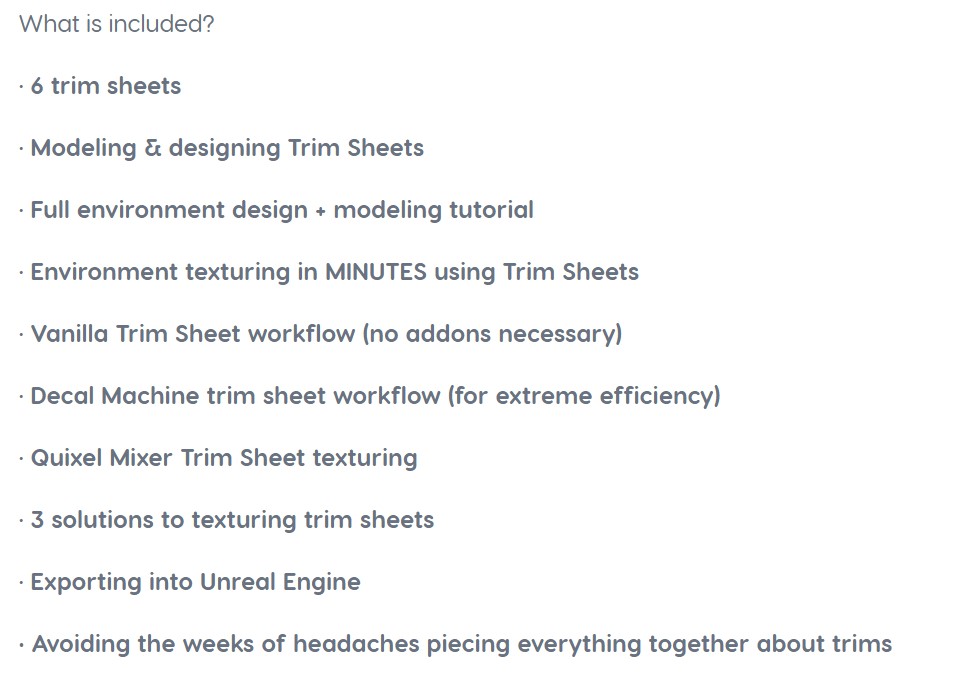Crafting a Top-notch Product Description

What stands between your high-quality product and a potential customer? The product description. A product description is what the customer sees when they first encounter your product. It's what should convey the product's features and your trustworthiness as a creator. If you want to set yourself up for success, it is as important to get the product description right as it is to get the product right. In this article, we will be looking at some of our top-selling products and identifying what their descriptions have in common in order to help you plan and improve your own product descriptions.
So let's dive in! When we take a look at the descriptions of the most popular products on Blender Market, a few things stand out: clear organization, attractive visuals, and an effective list of features.
Clear organization
A clearly organized product description allows customers to easily find the information that they're looking for, whether that's technical specifications, sample renders, product features or limitations, support resources, or testimonials.
- Use bold or CAPITALIZED text to draw attention to sections.
- Use bullet points to quickly convey lists of, for example, features or updates.
- Utilize visuals (renders, screenshots, gifs, videos) in places where they will convey ideas more effectively than text.
Depending on the complexity, nature, and cost of your product, you may not need a huge product description with lots of headings. But if your product is comparatively expensive and complex, you will probably need to put a little more effort in to show potential customers what they will be paying for.
For tips on writing your product description, read this.
Attractive visuals
You know the old saying, "a picture is worth a thousand words." Take that saying to heart and use visuals to share the more complex or nuanced aspects of your products that be difficult to convey using text alone. For tips on how to create a great featured image, give this article a read.
- Screenshots to help potential customers visualize what they should expect to see when using your product, or where to find a particular setting.

- GIFs to illustrate processes or examples of what your product can do.

- Videos to show off renders or guide customers through procedures, like installation or achieving a certain outcome with the product.
- Rendered stills to help the customer envision what they will be able to achieve with your product.

Feature list
This is really important! Imagine you're in an elevator going up a few floors and the other person in the elevator asks you what your product does. In this (possibly) unlikely scenario, you should have a few key features locked and loaded to share with them before the elevator stops and one of you gets out. Those key features are how people will remember your product and measure it against other products. If your product is very complex and has many features, consider including a short list of features at the top, which covers the primary things your product does, followed by a longer and more detailed list further down the page.
 A-Z Environment Design using Trim Sheets
A-Z Environment Design using Trim Sheets
The feature list is also where you can set your product apart from the competition. Particularly in cases where there are several products similar to yours—and at different price points—you will need to argue the case for why yours is the product that should be purchased. We don't advise throwing shade at or speaking ill of other products and creators, but simply highlighting the features that make your product the best choice.
Finally, when you're working on your feature list, don't focus solely on what the product does but spend some time spelling out how the product will benefit the customer. Will it make a normally time-consuming and challenging process faster and easier? Will it cut some tedium out of a common (and dull) workflow? Will it provide something to customers that they would otherwise have to make from scratch? Think about this part and articulate it well—it may make all the difference.
Remember: the care that you take in crafting your product description will reflect on the product itself. If your description is clean, clear, and well-thought-out, customers may infer that your product, too, is clean, clear, and well-thought-out. Pay attention to details like spelling and grammar, and have a friend look at it to make sure that everything makes sense and nothing is missing.



Chipp Walters
over 1 year ago
Very good! The single most important point you stress is communicating the CVP: Customer Value Proposition. No platitudes like, "The Best Materials," or "We go the extra mile" -- of course you do! What is unique about your product, and why would your customers be interested.
I stick with WHAT, WHO, WHY and HOW -- in that order.
WHAT is your product. Short sentence or paragraph. Too long and you don't have a good CVP.
WHO specifically is your product targeted at? Very important for a number of reasons I won't get into. If you have a couple really good testimonials, add them here.
WHY did you create this product? What need did you see that it solved? Good to include empirical data here.
HOW does it work. Features, lengthy description, examples.
Of course there's more, but that's a good start.